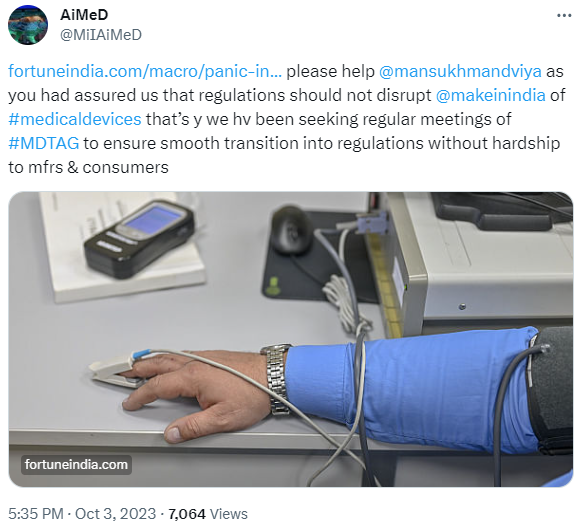Written by : Dr. Aishwarya Sarthe
October 5, 2023

The medical devices industry faces disruption as 200 producers halt operations due to regulatory barriers. Twitterati expressed apprehensions, urging swift resolution.
The medical devices industry is facing a crisis as more than 200 manufacturers have been compelled to halt the supply of their products due to the non-approval of their manufacturing licence applications under a recently implemented law before the cutoff date of October 1, 2023.
The Central Drugs Standard Control Organisation (CDSCO), the regulatory body, is grappling with a backlog of over 500 pending applications for manufacturing licences, primarily for high-risk Class D and moderately high-risk Class C medicines, estimated Rajiv Nath, forum coordinator for the Association of Indian Medical Device Industry (AiMeD).
AiMED Seeking Quick Resolution
On this, AiMED reiterated the urgent need for clarity, highlighting that sales and billing are legally prohibited without a manufacturing licence. The association has requested an extension and proposed issuing permits based on audits by notified bodies until formal approvals are granted.
The new regulations, effective from October 1, 2023, require medical devices classified as Class C and D to comply with the Drugs and Cosmetics (D&C) Act as per the 2017 Medical Devices Rules.
The development has triggered a wave of concern among industry stakeholders and advocates. AiMeD (@MiIAiMeD) took to Twitter, seeking urgent assistance tagging the Union Minister for Health and Family Welfare, Mansukh Mandaviya (@mansukhmandviya), calling for the need to ensure a smooth transition into regulations without causing hardship to manufacturers and consumers.

Nikhil Kurele, cofounder and CEO of Noccarc, a Pune-based medical device company, highlighted the necessity for clear and immediate responses from the authorities. He expressed concern about the adverse impact of regulatory ambiguities on the sector's growth and highlighted the challenges startups like Noccarc face.

The situation has attracted the attention of various individuals and media, reflecting the severity of the crisis within the medical devices industry.
The recent events underscores the pressing need for streamlined regulatory processes and transparent communication to alleviate manufacturers' concerns and ensure the uninterrupted supply of vital medical devices.